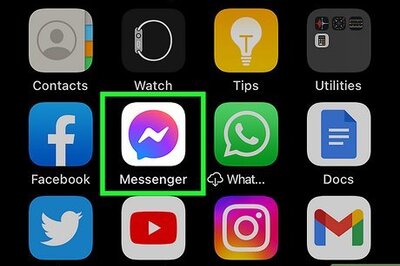
views
Noticing Communication Problems

Test text or voicemail response times. Send your friends a couple of texts or voicemails and watch to see how long it takes them to respond. Keep in mind that your friends might miss a single text or message or think that it doesn’t require a response. The key here is to look for patterns of poor or non-responses. If your friends seem to respond really slowly to messages, you may want to reconsider reaching out to them during a personal emergency.

Check your online friendship status. Go online to various social media websites, like Facebook or Instagram, to see if your best friends have blocked or stopped following you. You can also download an app, such as Who Deleted Me, that will alert you when others have removed you. If everything else seems okay, it may be worth asking your friends if they did some sort of Facebook friend purge. You could have accidentally been caught up in it. Another social media warning sign is if you notice that your friends stop tagging you in images or posts.

Demand honesty. Honesty is an important part of building trust and respect in a friendship. If you suspect that your friends are lying, it’s best to keep an open mind until you have clear proof. If you do catch them in a lie, you have the choice to either say something right then or make note of their untrustworthiness. As a friend, you must also be forthright if you plan to hold your friends to that same standard. Try to steer clear of white lies, as they are not always as harmless as they may seem.

Listen to how supportive they are. Try talking with them as a group or individually about a subject that is important to you. Watch their faces to see if they give you the normal signs of listening, such as nodding or making small comments. See if they ask you any questions or express any concern. For example, all of your statements might be met with “uh-huhs” from the group, even if they should be disagreeing with you.

Be careful if they only call with requests. This could mean that they’ve fallen into a pattern of needing your help, but not necessarily your friendship. If this happens, ask yourself if they’ve helped you as much as you’ve helped them. And, consider whether or not they are thankful when you do step in. Even if they are thankful when you help them with something, it could still be a lopsided friendship if they only call you when they need something.
Monitoring Negative Behaviors

Look for patterns. All friendships go through good and bad periods. To avoid overreacting, think about the entirety of your friendship and consider how often you’ve hit a bad or down period. If you feel constantly depressed or your friends are always negative, then you may be headed toward a separation. For example, you might notice that your friends were great until they got into relationships. To spend more time with them, you’ll likely need to find activities that are partner-friendly.

Pay attention to their schedules. Try to be a bit flexible when planning and see if they’ll make time for you. If they are always busy and booked up, then it’s going to be tough to move your friendship forward. Be patient, but don’t put your whole life on pause waiting for them. Notice if there is a pattern of them only being available when it suits them. For example, you may notice that they are never available when you want to make plans, but they are suddenly available on days when their other friends are busy. To be fair, if they are in a new relationship or starting a job, they might be working out how to manage time.

Watch if they always leave early. Instead of spending time lingering at a restaurant or out at a club, your friends now seem to head out as soon as possible. Another sign is if they consistently arrive late and leave together early. This could mean that they have other plans elsewhere.

Pay attention to any new friends. If your best friends talk about these new people all the time, then it’s possible that they are simply trying to widen their social circle. Try your best not to be jealous. Instead, listen to what your friends are saying. Are they describing these newcomers as your replacement or as a new friend for you?

Stop inviting everyone out for a week. Continue to answer any texts or calls, but don’t put the effort into creating new plans or organizing any gatherings. See if any of your best friends invite you out or suggest any activities. If they don’t, then it’s possible they aren’t willing to put the effort into continuing your friendship.
Moving Forward

Cut off ties. If you’ve determined that your friends are really trying to ditch you, then it might be time to let these relationships just fade away. You can cut down on your hang out time with them and minimize any text contact. If they are already avoiding you, then this is usually non-dramatic way of ending things.

Confront them. If you feel wronged by your friends or are worried that there is some sort of miscommunication, you might want to talk with them as a group or one-on-one. Tell them what you’ve noticed lately about their behaviors. Ask them how they think friends should act. Try to come up with a specific plan to improve your friendship, such as always responding to texts within a day. Having this type of conversation can get awkward. You might start by saying, “Is everything okay?” This is a non-confrontational way of getting them to start talking. Try to be understanding and avoid blaming your friends for everything or they may get defensive and the conversation could turn negative. Keep the focus of your statements on yourself. For example, "I feel" and "I think." Don't accuse them with statements like "You always" or "You never."

Take the chance to pursue new friendships. Try to find potential friends who have similar interests to you and who seem open to hanging out often. Don’t expect to be best friends with a new person right away, but stay hopeful that it could happen down the road.



















Comments
0 comment